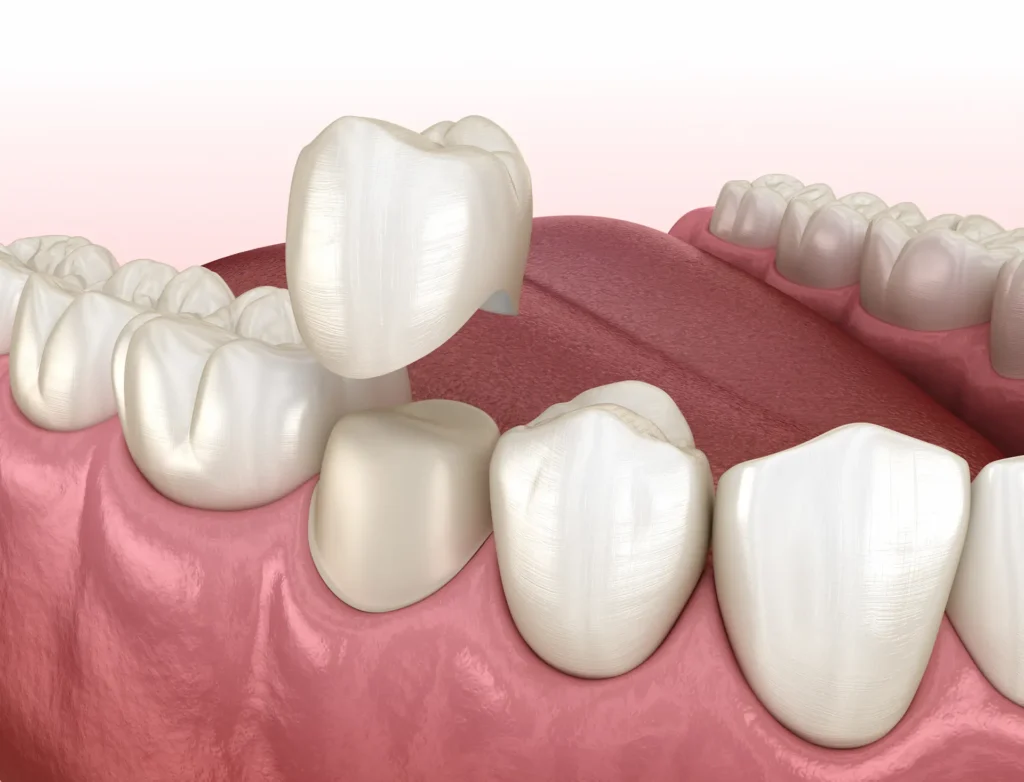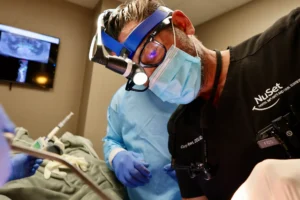When it comes to addressing oral health issues, making the right choice can often be a daunting task. Two commonly considered options are dental implants and crowns, each presenting its own set of advantages. However, determining the best choice for you relies on several factors.
Dental implants serve as durable, long-term solutions for replacing missing teeth, while crowns effectively cover and reinforce damaged teeth. In this article, we will thoroughly compare these two options, equipping you with the knowledge necessary to make an informed decision that aligns with your specific dental needs.
Dental Implants vs. Crown: What are the differences?
Dental implants and crowns serve different purposes in oral health care. While they may seem similar, their functions, materials, and applications vary. Dental implants replace missing teeth entirely, involving a surgical procedure to insert a metal post into the jawbone, which then supports a new artificial tooth.
On the other hand, crowns are caps designed to cover a damaged or decayed tooth, protecting and restoring its appearance and functionality.
To help you understand these differences better, let’s look at some key factors:
| Factors | Dental implants | Crowns |
|---|---|---|
| Aesthetics and Natural Appearance | Provide a natural-looking replacement for missing teeth. | Designed to blend with existing teeth, enhancing appearance. |
| Durability and Lifespan | Known for longevity, often lasting decades. | Durable but may need replacement after several years. |
| Oral Health Impact | Help preserve jawbone health, preventing bone loss. | Protect tooth structure, supporting overall oral health. |
| Cost Comparison | More expensive initially, but a long-term investment. | Generally less costly but might need replacement sooner. |
| Procedure Complexity | Involves surgical insertion of a metal post; more complex. | Less invasive; involves fitting a cap over the existing tooth. |
| Recovery and Adjustment | Longer recovery time post-surgery; adjustment period for comfort. | Quicker recovery; easier adjustment for most patients. |
| Suitability | Ideal for missing teeth; requires good jawbone density. | Suitable for damaged or decayed teeth, not for missing teeth. |
| Maintenance and Care | Low maintenance; regular dental hygiene suffices. | Requires care to avoid damage or decay around the crown. |
What Are Dental Implants?
Dental implants are a long-lasting solution for replacing missing teeth. They involve a surgical procedure where a metal post is inserted into the jawbone. Over time, this post fuses with the bone, creating a sturdy base for a new artificial tooth. This process not only restores the look of a natural tooth but also its function.

Dental implants are praised for their durability, with a 97% success rate, often lasting for many years. Their ability to prevent bone loss in the jaw is a significant benefit, contributing to their popularity in dental restoration.
Dental Implant Procedure
The dental implant procedure typically involves several steps. Initially, a dental surgeon inserts a metal post, usually made of titanium, into the jawbone. This serves as a root for the artificial tooth, which is followed by a healing period, during which the implant fuses with the bone—a process called osseointegration. After healing, an abutment is placed on the implant, onto which the artificial tooth, or crown, is attached.
In addition to the traditional multi-step dental implant procedure, there is also an option for “same-day implants.” This method allows the implant and temporary crown to be placed in just one visit.
It’s a convenient choice for those seeking a quicker solution, although it’s important to note that the final, permanent crown is typically fitted after healing. This same-day procedure is particularly beneficial for patients needing immediate tooth replacement due to injury or other urgent situations.
There are different types of dental implants:
- Endosteal Implants: The most common type, inserted directly into the jawbone.
- Subperiosteal Implants: This type of implant is placed under the gum but above the jawbone, suitable for patients with a shallow jawbone.
- Zygomatic Implants: The least common, anchored in the cheekbone instead of the jawbone.
- Mini Dental Implants (MDIs): Smaller in size, often used for stabilizing a lower denture.
Each type of implant has specific indications and is chosen based on the patient’s bone density and overall oral health requirements.
Benefits of Dental Implants
- Natural look and feel
- Improved speech and comfort
- Enhanced oral health
- Durable and long-lasting
- Convenient (no need to remove)
- Preserves jawbone and facial structure
- High success rate
What Are Dental Crowns?
Dental crowns are caps placed over damaged or decayed teeth. They restore the tooth’s shape, size, strength, and appearance. Crowns can be made from various materials, such as porcelain, ceramic, metal, or a combination of these. Each type has its specific use, depending on the tooth’s location and function.

Types of Dental Crowns and Their Applications
Porcelain Fused to Metal (PFM) Crowns
Porcelain Fused to Metal crowns are a popular choice. They offer a combination of the strength provided by a metal core and the aesthetic appeal of porcelain on the outside. This makes them both durable and visually pleasing. They are versatile, being a good choice for both front and back teeth.
All-Ceramic or All-Porcelain Crowns
All-Ceramic or All-Porcelain crowns are known for their superior aesthetic appeal. They provide the best natural color match, making them an excellent choice for front teeth. These crowns are also a good option for people with metal allergies.
Gold Alloys Crowns
Gold Alloys crowns are a blend of gold, copper, and other metals. They are well-regarded for their durability and gentle interaction with the surrounding teeth. These crowns are strong, don’t fracture easily, and are kind to the neighboring teeth, causing minimal wear.
Base Metal Alloys Crowns
Base Metal Alloys crowns are made from non-noble metals. They are highly corrosion-resistant and require the least amount of healthy tooth removal for fitting. These crowns are known for their strength and durability.
Each type of crown has its specific advantages, depending on the individual’s needs and the tooth’s location that requires the crown. The choice between these types should be made in consultation with a dental expert, who can advise on the best option based on the condition of your teeth and your personal preferences.
Benefits of Dental Crowns
- Restores tooth’s shape and size
- Improves appearance
- Protects weakened teeth
- Supports broken or worn teeth
- Covers dental implants
- It can last many years
- Customizable to match natural teeth
Making an Informed Decision

To make an informed decision about choosing between dental implants and crowns, consider the following:
- Get a personalized assessment of your oral health needs.
- Understand the steps, recovery time, and care for each option.
- How long will the implant or crown last?
- Understand the financial aspects, including insurance.
- Consider your current oral health and future needs.
- Learn from others’ experiences with implants or crowns.
- What care will your chosen option require?
- Which option aligns with your desired look?
- How will each option impact your daily life?
Ready to Get Started? Book a Consultation With Nuset Today!
Consulting with a dental expert is vital in making an informed choice. At Nuset Dental Implants and Oral Surgery, we are committed to providing personalized solutions for your dental care. We encourage you to seek professional advice and consider all factors before making your decision.
Our team uses cutting-edge technology and techniques to ensure the best results for our patients. We understand the importance of personalized care and work closely with each patient to find the best solution for their dental needs. Schedule a free consultation with us today to get started! Our commitment is to provide expert solutions tailored to your unique dental health requirements.
Frequently Asked Questions
Is it better to get a crown or implant?
The decision depends on the individual’s dental condition and preference. Crowns are recommended for teeth that are damaged but salvageable, as they help preserve the natural tooth. Implants are chosen for missing teeth, offering a permanent solution that also helps maintain jawbone structure. Ultimately, the decision should be made in consultation with a dentist, considering factors like oral health, cost, and personal comfort.
Are dental implants more expensive than crowns?
Yes, typically, dental implants are more costly than crowns. This difference in cost is due to the complexity and permanence of the implant procedure, which involves surgery and a longer treatment time. However, implants offer a long-lasting solution, potentially making them more cost-effective in the long term.
Can I get a crown instead of an implant?
A crown can be a suitable alternative to an implant if the tooth’s root is still intact and healthy. Crowns are used to restore the tooth’s function and appearance without the need for extraction and replacement. It’s a less invasive and often more immediate solution compared to implants.
Is it better to save a tooth or get an implant?
Preserving a natural tooth is generally preferred, as it maintains the natural structure and health of your mouth. However, an implant can be a better option if a tooth is too damaged or decayed. Implants provide a stable, long-lasting replacement and can prevent further oral health issues. The choice should be made based on the tooth’s condition and the individual’s overall dental health.
What dental implant services do you offer?
At NuSet Dental Implants and Oral Surgery, we offer various dental implant services to meet diverse needs and preferences. Each service is tailored to best fit your specific dental situation.
Here’s a look at the various implant services we offer:
- Full mouth dental implants
- All-on-4 Dental Implants
- All-on-5 Dental Implants
- All-on-6 Dental Implants
- All-on-8 Dental Implants
- Snap-On Dental Implants
- Mini Implants
- Zirconia Implants
- Single Arch Implants
- Full Arch Implant Supported Bridge
- Zygomatic Dental Implants
- Same Day Dental Implants
Where can I get dental implants near me?
If you’re searching for “dental implants near me,” NuSet Dental Implants and Oral Surgery has several convenient locations to serve you. Each office is equipped with state-of-the-art technology and staffed by experienced professionals dedicated to providing top-quality dental care.
- NuSet Dental Implants and Oral Surgery of St Louis
- 2821 North Ballas Road #225 St Louis, MO 63131 (Inside Town and Medical Building)
- Get driving directions
- NuSet Dental Implants and Oral Surgery of Scottsdale
- 8800 E. Raintree Dr Suite 170 Scottsdale, AZ 85260
- Get driving directions
- NuSet Dental Implants and Oral Surgery of Nashville
- 5651 Frist Blvd. #300 Hermitage, TN 37076
- Get driving directions
- NuSet Dental Implants and Oral Surgery of Clarksville
- 12431 Clarksville Pike Route 108 Clarksville, MD 21029
- Get driving directions
For personalized care and the highest standard in dental implant services, visit one of our locations. Schedule your appointment today and take the first step towards a healthier, more confident smile.





